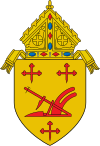John T. McNicholas
Roman Catholic Church |
|---|
John Timothy McNicholas,
Biography
Early life and education
Timothy McNicholas was born in
Priesthood
McNicholas was
McNicholas returned to the United States later in 1904 and assumed the role of
In 1909, McNicholas became the national director of the
Bishop of Duluth
On July 18, 1918, McNicholas was appointed the second bishop of the Diocese of Duluth by
Archbishop of Cincinnati
In May 1925, McNicholas was named
During the 1928 presidential election, which featured the first Catholic to win a major party nomination in the person of Al Smith, McNicholas addressed concerns that Smith would take orders from church leaders in Rome in making decisions affecting the country by declaring, "We, as American Catholics, owe no civil allegiance to the Vatican State."[6]
While observing the conversion of a group of seventy
"The sovereignty of the State, although it must be respected, cannot be exaggerated to the point that access to this land is, for inadequate or unjustified reasons, denied to needy and decent people from other nations, provided of course, that the public wealth, considered very carefully, does not forbid this."[8]
Death and legacy
On April 22,1950, at the age of 72, John McNicholas died from a heart attack at his residence in the College Hill neighborhood of Cincinnati.[9]Archbishop McNicholas High School in Cincinnati was named in his honor.[10]
Viewpoints
Denunciation of Hitler
In 1938, McNicholas condemned the persecution of
"Governments that have no fixed standards of morality, and consequently no moral sense, can scarcely settle the question of war on moral grounds for Christians ... who see and know the injustice of practically all wars in our modern pagan world. There is the very practical question for informed Christians who acknowledge the supreme dominion of God ... Will such Christians in our country form a mighty league of conscientious non-combatants?"[11]
Media morality
In response to Archbishop Amleto Giovanni Cicognani's call for a movement to counteract the influence of "salacious cinema",[6] McNicholas founded the Catholic Legion of Decency (later renamed the National Legion of Decency) in 1933.[12] The organization, which at the height of its influence claimed to have more than 22,000,000 Catholic members, sought to influence decency standards and boycott films deemed offensive by the Catholic Church.
Social justice
During the Great Depression, McNicholas advocated "conscription of excess wealth" as "wholly in harmony with the principles of Christian social justice" and named extreme concentration of wealth as one of the "crimes of the country".[9] He also said the state could not place on charity the full burden of caring for the unemployed.[9]
Ecumenism
In 1931, McNicholas joined clergymen of various faiths in speaking over "The Church in the Air", a CBS radio program.[9] However, he strongly prohibited Catholics from participating in non-Catholic religious ceremonies, saying, "The Catholic Church cannot give the impression that one religion is as good as another or that she must strive with those of other faiths for a common denominator in religion."[13]
References
- ^ a b c d e Curtis, Georgina Pell (1961). The American Catholic Who's Who. Vol. XIV. Grosse Pointe, Michigan: Walter Romig.
- ^ a b c d e f g "John T. McNicholas". The American Catholic History Research Center and University Archives. Archived from the original on 2010-06-10.
- ^ a b c d e "Archbishop John Timothy McNicholas, O.P." Catholic-Hierarchy.org.
- ^ The Catholic Encyclopedia and Its Makers, Encyclopedia Press, Incorporated, 1917, p.109
 This article incorporates text from this source, which is in the public domain.
This article incorporates text from this source, which is in the public domain.
- ^ a b "Religion: Rome". TIME Magazine. 1925-07-20. Archived from the original on February 19, 2012.
- ^ a b Fortin, Roger (2002). Faith and Action: A History of the Archdiocese of Cincinnati (1821-1996). Columbus: The Ohio State University Press.
- ^ "Religion: Archdiocese". TIME Magazine. 1926-09-27. Archived from the original on January 31, 2011.
- ^ "Apostolic Letter from Pope Pius XII to Archbishop John T. McNicholas". The American Catholic History Research Center and University Archives.
- ^ a b c d e f "M'NICHOLAS DEAD; ARCHBISHOP, WAS 72; Head of Cincinnati Archdiocese 25 Years Sponsored Plan for Legion of Decency". The New York Times. 1950-04-23.
- ^ McNicholas High School
- ^ "Religion: Peace". TIME Magazine. 1938-03-14. Archived from the original on August 26, 2010.
- ^ "Religion: Legion of Decency". TIME Magazine. 1934-06-11. Archived from the original on September 30, 2007.
- ^ "Religion: No Common Denominator". TIME Magazine. 1945-03-05. Archived from the original on December 21, 2011.
External links
- . . Dublin: Alexander Thom and Son Ltd. 1923. pp. – via Wikisource.




